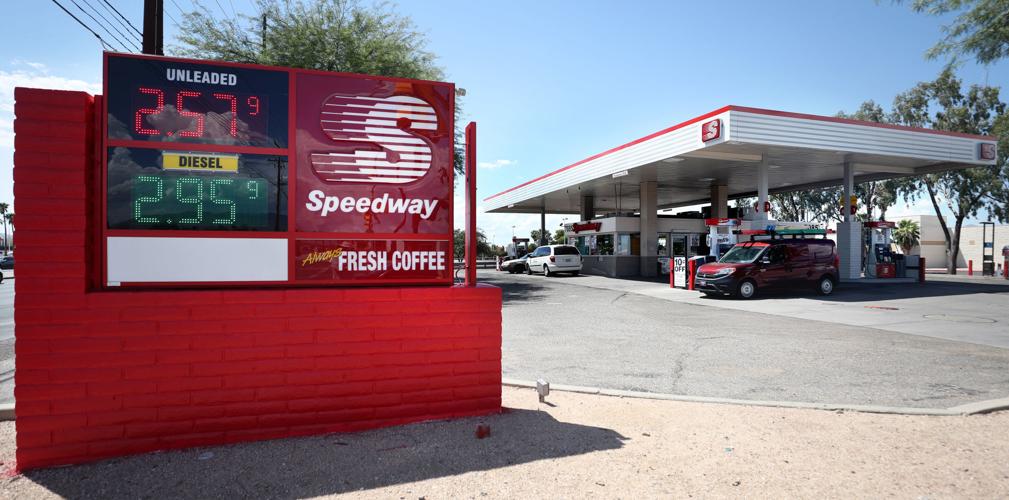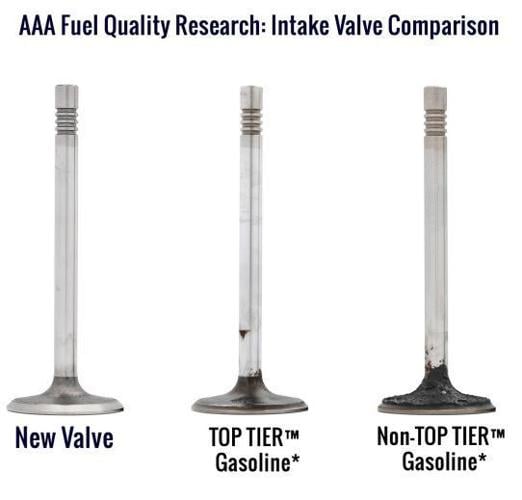Foothills resident Barbara Temkin had an unwelcome surprise recently when she saw the Shell gas station where she faithfully filled up on North Campbell Avenue was being converted to a Speedway convenience store.
Later, she learned that Speedway gas doesn’t meet the same industry standard Shell fuels do.
“First, it was the shock of the change without any warning, and then my mechanic has specifically recommended Shell for my car, so it was a substitution of a much lesser quality gasoline that was really annoying,” said Temkin, a psychologist who has lived in Tucson since 1977.
Another Foothills resident, Susan Hotchkiss, was dismayed to see the Shell station and Giant convenience store on East Sunrise Drive at North Kolb Road suddenly converted to a Speedway store.
“It’s going to change my driving habits, because I’m going to have to get gas sooner, before I get close to empty,” the retired Air Force major said.
Many motorists across Tucson and Arizona who loyally buy Shell or Chevron gas now must drive further to fill up.
About 30 local convenience stores that sold those major brands recently were converted to Speedways as the result of last year’s $23 billion acquisition of gas refining and retailing giant Andeavor by Ohio-based Marathon Petroleum, parent of Speedway Stores.
Shell gas is still available at seven standalone stations in the Tucson metro area — though only one appears to be north of Speedway — and Chevron still is sold at about a dozen local stations.
But it’s about more than just brand loyalty.
Shell and Chevron sell so-called Top Tier Detergent Gas — an industry certification that it contains a detergent package that keeps engines cleaner and is recommended by General Motors, Ford and other carmakers.
Temkin said she’s been using Shell gas for years, since a mechanic advised it after her 18-year-old European coupe developed expensive damage he blamed on bad gas.
“My mechanic had to drain the gas tank and clean my engine — that’s why I’m so touchy about gasoline,” she said, adding that after much searching she found a Chevron station just off her frequent route down North Campbell.
Hotchkiss started buying non-brand gas about five years ago when she bought a Volkswagen Golf GTI, trying to save some money since the car required higher-priced premium gas.
After a year, the GTI developed some performance issues her mechanic linked to lower-quality gas and at his urging, she’s been using Shell gas ever since.
“I learned some lessons then, and now I know about Top Tier gas,” Hotchkiss said.
Speedway, a subsidiary of Ohio-based refiner Marathon Petroleum Corp., is completing the process of converting 91 convenience stores in Arizona to its brand after Marathon acquired their former owner, Texas-based Andeavor.
The changeover to Speedway includes 29 stores in Tucson and several more in Marana, Sahuarita and Oro Valley, mainly Giant convenience stores that sold Shell gas and two Chevron locations.
Marathon’s deal for Andeavor also included ARCO, whose gas is sold at AM/PM convenience stores operated by BP America.
The Tucson area’s nine ARCO stations so far have been unaffected by the merger changeover, and Marathon’s CEO has said the company intends to keep the brand among its operations in the West and Mexico.
Shell, Chevron and ARCO are among 52 gas brands that are certified as “Top Tier Detergent Gasoline” by an industry group that mandates a standard level of detergent additives known to reduce performance-robbing engine deposits.
Other Top Tier gas retailers in the Tucson area include QuikTrip, Valero and Costco Wholesale.
Circle K — a local convenience-store market leader with more than 100 stores with gas pumps in the greater Tucson area — does not sell Top Tier gas at its unbranded locations, though it is piloting a new Circle K branded gas with special additives touted to boost mileage in Florida and elsewhere.
Though Marathon-branded gas is Top Tier, the private-brand gas sold at Arizona Speedway stores is not.
“At this time, Speedway does not offer Top Tier fuel,” company spokeswoman Marna Berlekamp said in an email response.
“In the retail fuel industry, there are a variety of independent certifications retailers may acquire,” she said. “Speedway and all of its grades of fuel are compliant with all local, state and federal regulations. Rest assured that Speedway’s priority is to consistently offer quality fuels at competitive prices, without sacrificing standards.”
The Tucson area lost some other Top Tier gas stations in 2017 when Circle K completed its acquisition of CST Brands’ Corner Stores, which locally sold Top Tier Diamond Shamrock fuels.
Texas-based Empire Petroleum, another non-Top Tier retailer, also acquired a half-dozen local Corner Stores and has converted them to its Fast Market store brand. Circle K spokeswoman Donna Humphrey said the company has no current plans to add Top Tier or its “Miles” mileage-boosting gas to its offerings in Arizona.
Top Tier gas was introduced in 2004 by General Motors, BMW and other automakers in the belief that federal fuel-quality standards were not sufficient, and it is recommended by many car experts for its engine-cleaning properties.
Ten top automakers now recommend Top Tier gas, besides GM and BMW, including Fiat Chrysler, Ford, Honda, Toyota, Volkswagen, Mercedes-Benz, Audi and truckmaker Navistar. The organization added a Top Tier program for diesel fuel in 2017.
AAA began recommending Top Tier gas in 2016 after conducting a study that showed that Top Tier gas leaves left 19 times fewer engine deposits than gas that meets the federal standard for fuel quality.
During extended engine testing, AAA also found Top Tier gas reduced intake valve deposits by 45 to 72% over a 5,000-mile interval.
Analyzing prices over a yearlong period, AAA also found that Top Tier gas cost an average of 3 cents more per gallon than non-Top Tier gas. Consumer Reports also has recommended that motorists use Top Tier gas at least most of the time, based on AAA’s study.
“We felt they made a pretty compelling case with their testing,” said Jeff Bartlett, deputy editor of Consumer Reports. “We would encourage people to buy Top Tier gas when they can but understanding, as people travel or have different time events, they may not be able to do it all the time. But if they do it most of the time, the detergent effects would seem to promise better engine operation and reliability.”
Automakers also recommend higher-octane “premium” gas for certain higher performance vehicles, confusing the issue for consumers, but that is unrelated to the Top Tier requirements, Bartlett said.
Top Tier suppliers must meet the detergent additive standards across all their fuel octane grades, so consumers can shop by brand, he noted.
Many mechanics also recommend Top Tier gas.
Rick Furrier, general manager of the longtime Tucson auto-repair chain Jack Furrier Tire & Auto Care, said using Top Tier gas can help prevent carbon buildup in engines that can diminish performance and lead to costly repairs down the road.
“The highest quality of fuel people can buy, that’s better in the long run, too,” Furrier said. “Buying Top Tier fuel is always recommended.”
Furrier — who admitted that he often fuels up his Chevy truck with non-Top Tier fuel because of his hectic schedule — said that motorists who can’t always buy Top Tier gas can keep engine gunk at bay by periodically adding a fuel treatment like Chevron’s Techron or Seafoam.
Using cleaner-burning fuel is especially important with cars and trucks that use direct fuel injection, a newer fuel-delivery technology that increases efficiency but is prone to carbon deposit buildup, he said.
Introduced in the mid-1990s, the use of so-called Gasoline Direct Injection, or GDI, has ramped up in recent years, to more than 51% of new car models in 2018, according to the U.S. Department of Energy.
Yet only about one-third of gas stations in the U.S. offer Top Tier fuel, according to the Top Tier organization.
While Top Tier has its advantages, all motor fuels sold in Arizona must comply with minimum federal standards for fuel quality.
Gasoline and other fuels are tested by the state Department of Agriculture’s Weights and Measures Services Division, using test procedures set by ASTM International, an industry standards group formerly known as American Society for Testing and Materials, said Michelle Wilson, associate director for the division.
The state agency tests for factors such as octane levels, ethanol, sulfur and aromatics such as benzene to meet federal fuel quality and emissions standards, Wilson said.
Weights and Measures regulates about 2,000 gas stations across the state and inspects gas pumps periodically and in response to consumer complaints, which mainly involve calibration of the dispensing equipment, she said.
In fiscal 2018, the agency conducted nearly 20,000 gas pump tests in fiscal 2018 while analyzing 535 fuel samples, department documents show.






